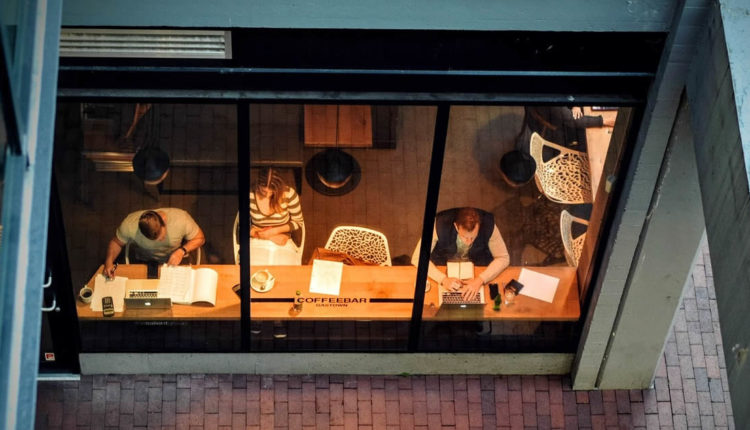Does Starbucks Make You Smarter?
 Could walking through the door of a Starbucks make you smarter? The answer might surprise you.
Could walking through the door of a Starbucks make you smarter? The answer might surprise you.
One thing the coffee giant has been very smart about is preserving the powerful aroma of roasted coffee beans. Remember how they quickly corrected the smelly egg fiasco? There may be a benefit to their aromatic environment beyond customer experience and consistent branding… Research shows that the mere smell of coffee can improve some cognitive functions.
It’s long been known that caffeine can make you less sleepy and more alert. People drink caffeinated beverages to stay awake, and even buy caffeine tablets for the same reason. Researchers used fMRI scans to show that coffee stimulates areas of the brain associated with memory and attention.
Coffee Smell’s Placebo Effect
Years ago, I wrote about a rat study in Japan that showed their brains were stimulated by the smell of roasted coffee. At the time, the researchers speculated that humans might be revived in the same way. Their guess was on-target.
Does Starbucks Make You Smarter? The answer might surprise you... #Neuromarketing Click To Tweet
A study last year had subjects answer math questions from the GMAT, the test used to evaluate MBA program applicants. A group that took the test in a room with a coffee aroma answered more questions correctly than a similar group in a room without a scent. This might remind you of author John Medina’s experiment with Brut cologne, but the mechanism seems to be quite different.
The researchers in the coffee study think that the coffee aroma had a placebo effect. The subjects smelled coffee and expected to perform better. The expectation of alertness and improved performance led to the better test results, rather than some chemical action of the coffee scent. The coffee scent contained no caffeine. (Of course, it’s possible that there is some potent aspect of the smell itself – presumably, the Japanese rats that responded didn’t have a major coffee habit.)
Priming for Performance
University of Toronto researchers recently published results which verified the concept that coffee cues prime the brain with an expectation of increased sharpness. Subjects from cultures where coffee drinking is common experienced higher levels of alertness and attention when primed with coffee cues than those from tea-oriented cultures.
Priming can take many forms – scents, imagery, even word puzzles seeded with terms intended to invoke non-conscious responses. The father of priming research, John Bargh, explained the concept when we spoke a few months ago. (See John Bargh – Priming the Unconscious Mind.) In that conversation, he also answered critics of priming research who say experimental results have been difficult to reproduce. Scent is likely the most powerful cue, but imagery, logos, words, etc. might work.
Students who smelled #coffee scored better on a math test. Really! #Neuromarketing Click To Tweet
Get Smarter
The wealth of research on the effect coffee and coffee aromas on mental performance seem conclusive. Here are a few takeaways:
Caffeine arouses your brain. The priming effects of coffee aromas and other cues are based on the expectation of the effects of caffeine. The physical effects of ingesting caffeine are real. So, the most direct way to get the desired mental boost is to drink regular coffee. At least for a while, you should be a little sharper. Maybe even a little better at math.
Coffee cues invoke the placebo effect. The studies I describe above show that coffee aromas and other coffee cues can prime the brain with the expectation of arousal, leading to an actual change in arousal. So, if you can’t drink coffee (or don’t want to) and still want a mental boost, smell some coffee beans. Or, look at images that remind you of drinking coffee – a photo of your favorite coffee shop, an overflowing sack of coffee beans, a mug with a Starbucks logo… whatever works for you.
Individual results will vary. Beyond the fact that individuals will experience different effects from consuming caffeine, the research shows that the priming effects depend on experience. People with no history of drinking coffee will likely see a smaller placebo effect than those who often experience the real thing, as will people from cultures where coffee and mental alertness aren’t linked in the culture.
Duration is uncertain. The simulated GMAT exams were short. It seems unlikely that a whiff of coffee aroma would keep you alert all day, or even for a period of hours. Just as a coffee drinker might have multiple cups in the course of a morning or day, refreshing the aroma periodically might be helpful in maintaining alertness.
What about decaf? Good news for decaf drinkers… None of the studies I found specifically looked at decaf consumption, but the priming research suggests that the placebo effect should kick in. What better “coffee cue” is there than seeing, smelling, and drinking real coffee that lacks only an invisible, tasteless substance?

Working in coffee shops. Over the years, I’ve enjoyed writing in coffee shops. I always thought I chose to do that in order to be less isolated than I would be in my solo office. But, perhaps I unconsciously found the combination of coffee aromas and actual coffee consumption made me sharper and more productive. (Nespresso found that a huge part of coffee satisfaction had to do with coffee shop aromas, and redesigned their home espresso machines to release more coffee smell.)
Long-term effects? Another subject the studies don’t shed much light on is whether the measured effects can be maintained over time. For example, if I never drink coffee but smell coffee beans before I start writing will I see the same benefit after a month or a year of following the routine? My speculation is that the placebo effect will be strongest if when the expectation is underscored by physical experience. If I drink coffee often, I would expect the priming effect of a coffee aroma or other cue to be stronger since I am conditioned to expect the real thing. Nevertheless, a strong belief in coffee-induced alertness might indeed work even over extended periods.
So, wake up and smell the coffee. Your brain will thank you!
You might get more done if you work in a #coffee shop! #Neuromarketing Click To Tweet
